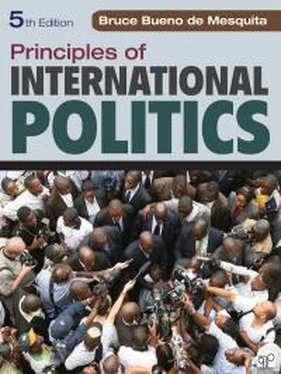Punishments
feasibility of administering, 285–286 dilemma, 139, 141–145,
grim trigger strategy, 254, 255, 256–257
See also Sanctions
Puppet governments, 444
Pure strategy, 146, 150
Putin, Vladimir, 85
Qaddafi, Muammar, 29, 92, 402, 503
Quebec, 440
Quotas
immigration, 496
imports, 358
oil production, 52, 243, 259–260
Rally round the flag effect, 222
Random case selection, 52, 57
Rational actor perspective, 7, 143
Rational decision making, 6–8, 131
Reagan, Ronald, 48, 49, 72, 501
Real IRA, 440
Realism and neorealism
Cold War and, 178 (figure), 179, 188–190, 189 (figure)
development and themes, 23–24
falsifiability and, 60
individual choice and, 30
liberalism compared, 24, 25
parsimony and, 23, 41–42, 43
perceptions distinguished from, 58
power transition theory contrasted, 10, 195
theories distinguished, 41
theories of war, 23–24, 175–195
unitary actor assumption, 23, 41, 181
view of international law and organizations, 23–24, 25, 263, 298, 299
Reality
as inconsistent with predictions, 48, 58–59
assumptions and, 37, 41, 45–46, 180–181
perceptions of, 97, 113, 441
theory as simplification of, 23, 41, 46
Receptivity to trade, 350–351
Recession, 198, 210, 283, 362, 364, 365, 366, 367, 503
Reflection, 26, 312–313
Regime legitimation, 26, 27–28
Regimes, as norms. See Norms and regimes
Regional hegemons, 200
Religious beliefs, 60
Religious freedom, 26, 485–486
Reluctant terrorists, 420, 422–423, 425–427, 429
See also Terrorism and terrorists
Renaissance, 485
Rent-seeking, 65, 237, 463–464
Repeated interaction, 251–257
Replicable tests, 57
Republican government, 485
Reputation, 214, 258–259
Resource allocation. See Distribution of resources
Resource curse, 307, 308, 413
Resources (capabilities), 244
Resurrection hypothesis, 217–219, 223–225
Revealed preferences, 311, 319
Reverse causality, 161–162
Revolution
democracy and, 402, 404
foreign aid and, 384, 400
historical developments, 488, 489, 491, 493, 500, 503
public goods provision effect on, 404–413
structural view on, 83
Rhetoric, 26, 116, 271
Rhetoric and anecdotes, 98
Ricardo, David, 328, 329, 330
Ricardo-Viner Theorem, 379
Richardson model, 40
Rigged-election polity. See Autocracy
Rio Grande, 490
Risk acceptant, 127 (note 7)
Risk averse, 127 (note 7)
Risk neutral, 127 (note 7)
Risk premium, 366–367
Risk taking, 203–204
Rival goods, 243–244
River resources, 73, 243–244
Role redefinition, 26, 312
Roman Catholicism. See Catholic Church
Roman Empire, 477
Romania, 61, 283, 491
Roosevelt, Franklin D., 62, 495
Rule of law, 294, 297, 328, 389 (note 2), 403, 417, 418, 491, 494, 497
Russia
arms control negotiations, 72, 222
core freedoms in, 305
domestic institutions, 85
environmental issues, 280–281, 283
foreign assistance and, 412–413
historical developments, 478 (map), 480, 487, 491
invasion of Georgia, 192–193, 502
national capability of, 194 (table)
North Korean nuclear policy, 104, 112, 113, 114, 117, 118, 119, 120, 121
oil politics and, 193, 465
policy preferences, 105, 106 (figure)
revolution and, 235, 491, 493
role in international system, 197
World War I, 178 (figure), 179, 491, 492, 493
See also Soviet Union
Russo-Japanese War, 191 (note) 2, 490
Sadat, Anwar, 500
Safety standards. See Health and safety standards
Salami tactics, 174
Salazar, Antonio de Oliveira, 199
Salience variable, 116
Sanctioning, 65
Sanctions
against North Korea ( see North Korean nuclear program)
effectiveness of, 159
problem explained, 72
Saudi Arabia, 244, 302
Savonarola, Girolamo, 481
Scientific method, 26, 56–60
Scotland, 283
Security, as national goal, 9, 11, 23, 187
See also National security
Security dilemma, 176
Selection bias, 51, 52, 231
Selection effects, 27, 311
Selectorate, definition of, 65
Selectorate theory, 28, 66, 79–94
democratic peace explained by, 79, 449, 450–454, 456–463
failures of nation building explained by ( see Democratization)
features and arguments, 80–81, 85, 93–94, 294–295
identifying and assembling winning coalitions, 82–94
likelihood of warfare, 230–231 (table)
membership of international organizations, 263–264
motivations for warfare, 229–230 (table)
“selectorate” and “winning coalition,” terms defined, 79–80, 81
view of foreign aid ( see Foreign aid)
war effort, 231–237
Self-determination, 493
Self-help, 23, 101, 144–145, 175
Self-interest (personal interest)
implications for international relations, 23
nation building affected by, 444–445 ( see also Democratization)
Self-sufficiency, 333, 376
Separating equilibrium, 427
September 11, 2001, terrorist attacks, 67, 418, 419, 476, 502
Serbia, 178 (figure), 179, 208, 209, 491
Seven Weeks’ War, 487, 490
Seven Years’ War, 192, 487
Shadow of the future concept, 251, 255
Shallow agreements, 243, 261, 272, 282–284, 286, 302
Shallow decisions, 264
Singapore, 92, 307, 369
Single-peaked preferences, 105–109, 108 (figure), 114, 118–119, 123
Sino-Japanese War, 490
Six-Party Talks, 100–101, 105, 111–114, 116–123
Slavery, 485, 487, 488
Slovak Republic, 283
Smoot-Hawley Tariff Act, 326–327
Social contract, 485
Socialism, 387, 392, 493, 494, 502
Social welfare, and free trade, 349
Solidarity movement, 501
Somalia, 199, 208
South Africa, 498–499
South Korea
commercial airliner shot down, 100
North Korean aggression and, 129–136, 148–163, 462, 498
North Korean nuclear policy and, 106–107, 114, 116, 117, 118, 119, 120–121, 123
policy preferences, 105, 106 (figure)
South Sudan, 166
South Vietnam. See Vietnam; Vietnam War
Sovereignty, 169, 186
after World War II, 496–497
human rights and, 297, 316–319
Soviet Union
alliances and, 179
arms control negotiations, 72, 222, 500, 501
China and, 190
Cold War politics and, 179, 198, 387, 392, 497, 500, 501
Cuban Missile Crisis and, 19–21, 211–215, 218, 499–500
disintegration and aftermath, 283, 402, 481, 501–502
end of Cold War, 402, 501–502, 503
interventions by, 466
invasion of Afghanistan, 500–501
invasion of Georgia, 192–193
North Korea and, 99
polarity and stability analyses, 192–193
socialist economic policies of, 387
trade with U.S., 501
World War II and aftermath, 452–453, 495, 501
See also Communism; Russia
Spain
democracy and, 199
EC decision-making rules, 199
environmental issues, 283
historical developments, 188, 478, 480, 482–483, 486–487, 491
recession and, 365
trade politics and, 357
Spanish-American War, 491
Spanish Armada, 483
Spatial models, 27
definition and use, 101, 139–140
See also Median voter theorem
Special interest groups, 323–324
Specialization, 330
Specific factor mobility, 379–380
Speech rights, 26, 80, 296, 302, 305, 307, 403
Читать дальше












